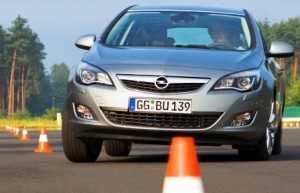The Chief Executive Officer of loss making Opel/Vauxhall, Nick Reilly, today announced what he claims is a five-year €11 billion “Plan for the Future” that he says will update 80% of Opel/Vauxhall vehicle lines.
Reilly also said today that the external auditor, Warth & Klein, called the plan “sound and viable.”
Opel formally applied for loans or loan guarantees from the German government at the same time.
As part of the plan, Opel owner General Motors is looking for €2.7 billion through loans or loan guarantees from European politicians. Thus far the Europeans appear content to let U.S. taxpayer-owned and subsidized GM carry the burden without the involvement of European taxpayers.
This is a showdown not unlike the one GM faced in the U.S. when it sought government aid, that after much posturing, was eventually forthcoming. However, it took a bankruptcy to accomplish, something that is not being seriously discussed thus far, or at least publicly, in Europe for Opel.
GM has been seeking money from European governments since the fall of 2008 when it was becoming clear that it along with its subsidiaries were insolvent.
When it canceled the sale of Opel last fall to Magna and decided that Opel was strategically too important to the world’s second largest automaker, GM clearly placed itself in a weakened bargaining position.
“We have no reason to doubt that we will win support from those governments that have an interest in a long-term and sustainable future of Opel/Vauxhall, which in turn will provide long-term security for several thousand jobs across Europe,” a GM spokesperson told TheDetroitBureau.com. “We have been in very constructive talks with all European governments with Opel/Vauxhall sites and are confident that we will win support for our plan.”
GM has already injected €600 million into the new Opel/Vauxhall business. In addition, GM provided €650 million in advanced payments in January to ensure Opel solvency.
Critics claim that the only reason GM had the cash for such a transfer of funds is because U.S. and Canadian taxpayers have given it $50 billion. (Click here for that story.) They also note that the European Union central government is vehemently against bailouts of automakers, although it readily pumped billions into banks and other financial institutions last year.
“We are extremely pleased that we now have independent confirmation that our plan is sound and will place Opel and Vauxhall on the road to sustainable, long-term profitability,” Reilly said.
The exact amounts expected from various governments were not specified, but GM insiders said it would be apportioned by the approximate employment level in each country.
If so, Germany would have to supply roughly half of the €2.7 billion required to keep the company afloat while it restructures.
GM recently changed lobbyists. Volker Hoff has been appointed Vice President, Government Affairs, for Opel effective February 1. (Click here for that story.) Hoff, who has been a Member of the Parliament of the German federal state of Hesse since 1991 – not coincidentally the home of Opel’s main plant and headquarters in Russelsheim. Between 2006 and 2009, he was a State Minister of the Hesse administration. He has also been managing partner of various consultancies and a member of the advisory council of a major Government Relations agency.
Hoff’s job will entail forcing some painful political choices on many European politicians, since Opel has plants in Germany, the U.K., Spain and Poland and parts making operations in Hungary and Austria. The plan requires the sacking of about 17% of Opel/Vauxhall’s workforce. This means the elimination of 8,300 workers of 48,000, spread across most of Europe and includes 1,300 employees in sales and administration and 7,000 jobs in manufacturing. This includes closing of the Opel production facility in Antwerp, Belgium, as previously announced.
European politicians are calling for GM to increase its investment in Opel, as a requirement for some loans.
Opel/Vauxhall will also reduce its capacity by approximately 20%, and is asking for concessions from its unions. The powerful German metalworkers union has vowed to concede nothing without job guarantees. Other unions are calling for an equity stake Opel.
The business plan predicts that Opel/Vauxhall will break even by 2011, and be profitable by 2012. It is based on economic forecasts that 13.4 million cars will be sold in Western Europe this year – a reduction of more than 20% from 2007, but still optimistic according to some European forecasts. Opel/Vauxhall does not believe the market will come back to the levels seen earlier in this century for quite some time.
The viability plan states that 80% of Opel/Vauxhall carlines will be at an age of three years or less by 2012. This includes eight launches in 2010 alone – such as Meriva, Corsa, Movano and Astra Sports Tourer – and another four in 2011, most notably the extended-range electric vehicle Ampera, an industry-first in Europe, which will be built in the U.S.
In addition, Opel/Vauxhall will spend €1 billion in “innovative and fuel-efficient” powertrain technology, including an electric vehicle in addition to the Ampera, battery-electric vehicles in smaller-size segments, and the expansion of LPG and CNG applications, start/stop technology and smaller engines.

